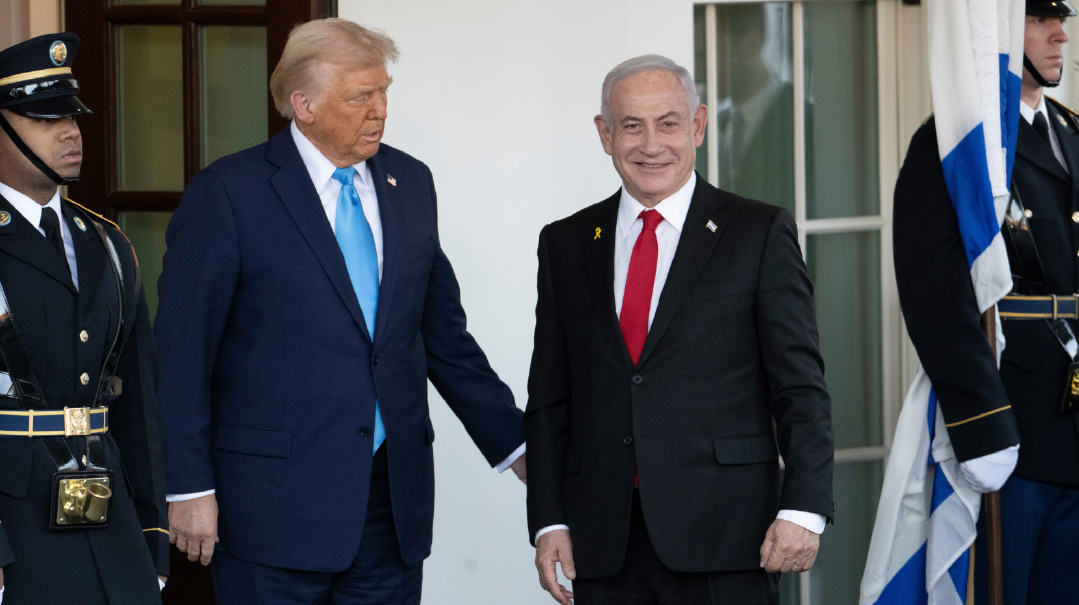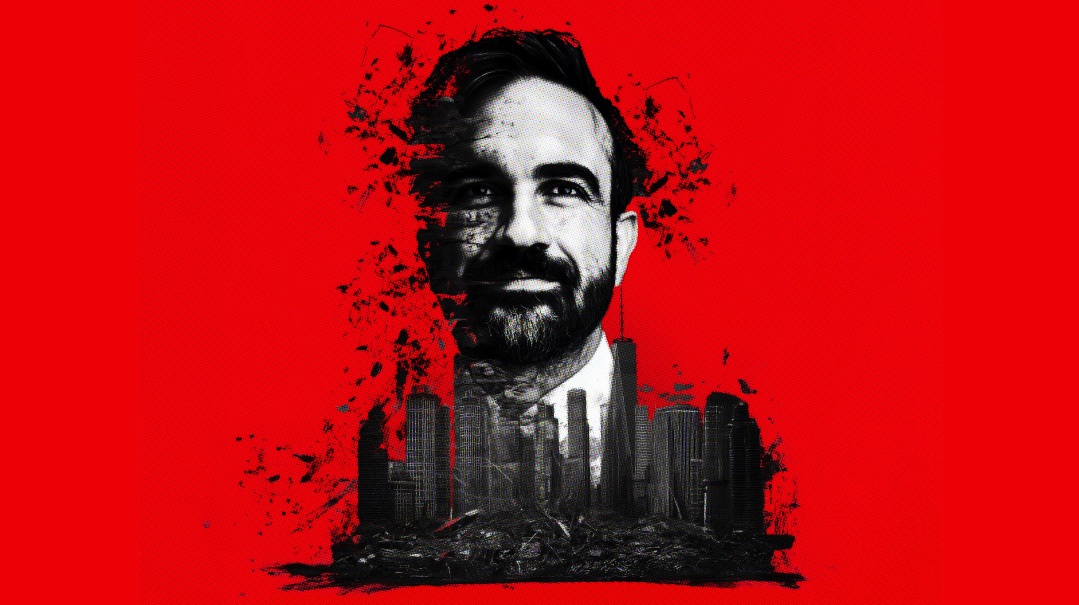Adams: Guest from Gracie Mansion

New York’s Mayor Eric Adams on why pro-Israel progressivism is here to stay. An exclusive interview in Jerusalem
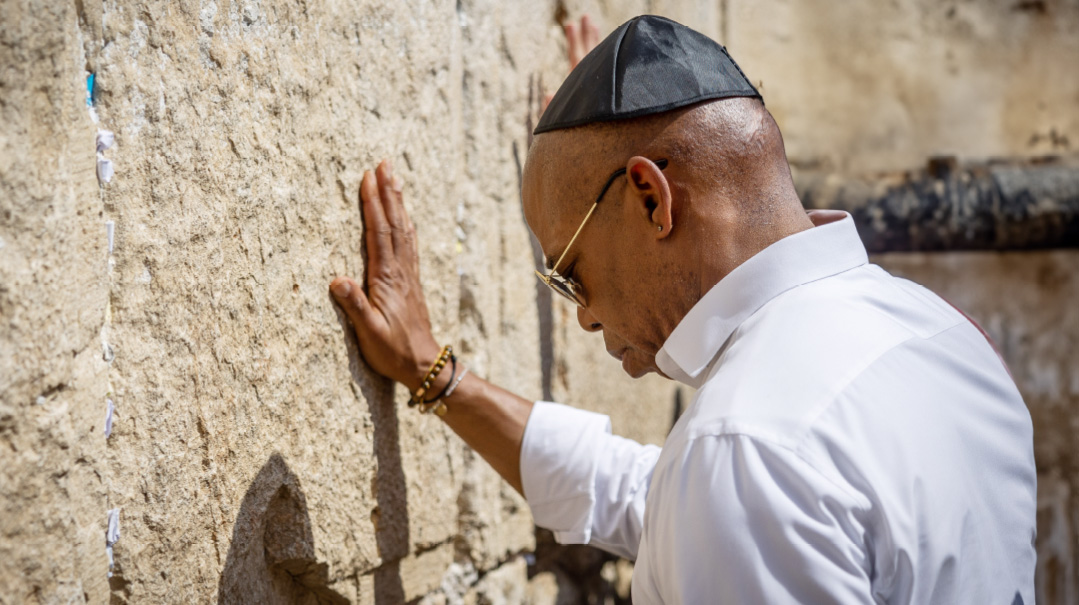
Photos: Elchanan Kotler, Flash 90
With a well-received visit to Israel last week accompanied by a notably Orthodox delegation, New York’s Mayor Eric Adams cemented his reputation as a centrist Democrat to watch. In an exclusive interview overlooking the Kosel, he made the case that his pro-Israel progressivism is the wave of the future.
The black-and-white newsreel of New York mayor Vincent Impellitteri’s 1951 Israel tour shows him visiting a Haifa car factory and receiving the red-carpet treatment from David Ben-Gurion, in a young, long-gone country. The trip set a precedent, establishing the Israel visit as a standard practice for mayors intent on burnishing their pro-Jewish credentials.
Last week, though, Gracie Mansion’s current resident departed from that formulaic script. While his three-day tour included the standard homages to Israeli politicians and the tech scene, Eric Adams also struck a distinctly chassidic note. An early stop was a visit to Jerusalem’s Hadassah Hospital, where he went to pay his respects to the Toldos Avraham Yitzchak Rebbe, in a meeting arranged by Joel Eisdorfer, a chassidic senior aide.
“When I heard that Rabbi Kohn was ill, I immediately wanted to show my respect, because I know he has followers in Brooklyn and throughout New York City,” Adams told Mishpacha in an interview at the Aish HaTorah World Center. “The rabbi thanked me for my support for the community, and for dealing with anti-Semitism. It uplifted me that someone going through his own crisis was willing to bless others.”
While the event was at most a footnote in the mainstream media coverage of Adams’ trip — which focused heavily on whether the mayor would insert himself into Israel’s ongoing judicial reform controversy — the hospital visit was widely noted in Orthodox media in America and Israel.
It set the tone for a mayoral visit in which the Orthodox community featured prominently. With a delegation in which visibly Orthodox aides and community leaders were a notable presence, the tenor of the visit showcased the heightened standing of the community in the Adams administration.
“What was on view on this trip was the close, decades-long relationship that the mayor has with large parts of the Orthodox community, which means that for the first time the community is on the inside of the administration looking out,” says David Greenfield, a former New York city councilman and current CEO of the Met Council.
“In the past, the frum community would have to fight to get its fair share of government resources, but now the community is an integral part of the policy making to begin with, because there’s never been a mayor closer to the frum community than Eric Adams.”
That relationship was on view in the mayor’s recent full-throated defense of yeshivah education, published as an op-ed in these pages in response to a series of attacks on yeshivos in the New York Times.
As a man who wears his own faith proudly, Eric Adams’s natural affinity for the Orthodox community was also on display in his choice of base — half a day was spent headquartered at the Aish HaTorah World Center after visiting the Kosel.
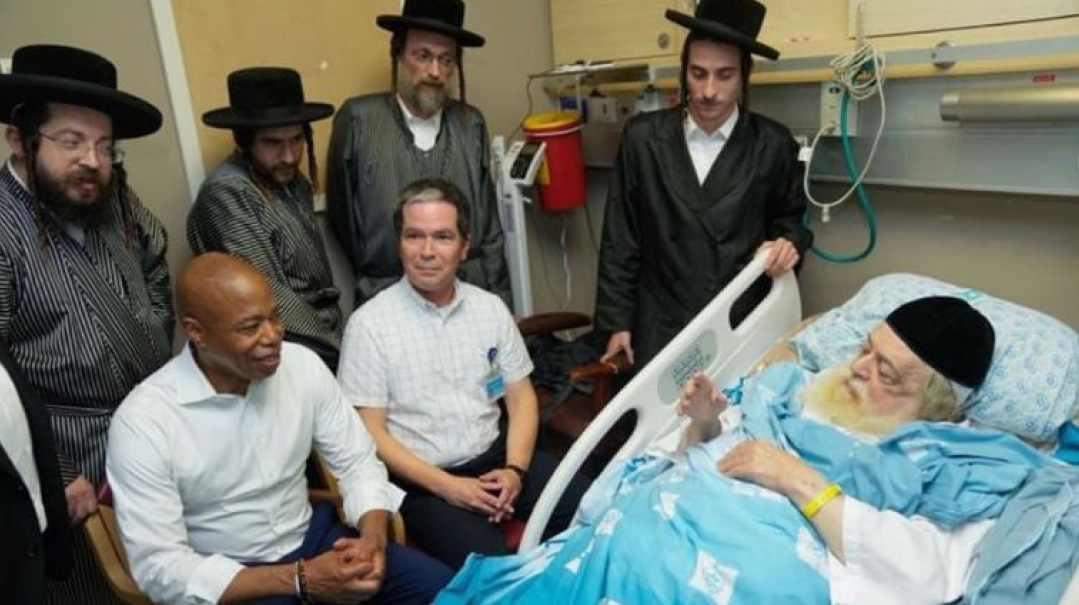
Progressive and Proud
Gesturing to the Old City vista spread out behind us, Adams resorted to the kind of quick humor that is his trademark, along with a wide smile. Asked what he discussed with Moshe Leon, his Jerusalem counterpart, the mayor quipped, “I told him that he’s the mayor of the second most important city in the world.”
Ready banter and bonhomie, among Eric Adams’s most potent weapons as a politician, are regularly deployed to parry uncomfortable questions. Those skills were much in demand on this trip, as he navigated the minefields of an official visit to Israel.
Life for pro-Israel Democrats is challenging: They have to stake out their own position, while being answerable for the extremist antics of their party’s pro-Palestinian wing.
It’s clear where Eric Adams himself stands. “I’ve been on many Israel trips with different political leaders,” says Eric Goldstein, CEO of the UJA-Federation of New York, which co-sponsored Adams’s mission, “and I can say both that I’ve rarely seen such boundless energy to learn and that the mayor is truly a friend of Israel. He really feels a connection to this country, and it’s not just about New York politics.”
To Adams himself, there’s a clear self-definition: He’s a pro-Israel progressive.
“I’m a pragmatic progressive. I am clearly progressive in my policies, but there’s a huge mistake that’s playing out on the American political landscape. We’ve allowed a small number to create a litmus test that you must be anti-Israel in order to win the badge. That’s wrong: Progressive politics is about public safety, about holding police accountable, about education and employment.”
The attempt to take back a progressivism that he says has been captured and is now flying under a false flag is vintage Eric Adams.
“We have allowed a group to hijack the term progressive,” Adams said on the campaign trail in 2021. “What I’m saying to the Democratic Party — stop believing a numerical minority is what the numerical majority is.”
Echoing that theme, Adams points to House Minority Leader Hakeem Jeffries and Reps. Yvette Clark and Ritchie Torres — vocal pro-Israel progressives — as evidence that the progressive label is not synonymous with hostility for the Jewish state.
But how can Adams deny the fact that for most Americans, progressivism is indelibly linked with the extreme version of the so-called “Squad” — the Congressional grouping of anti-Israel Democrats led by Ilhan Omar and AOC?
Mayor Adams contends that it’s a passing phase — that eventually the Squad will fade — and he draws a surprising parallel: the swift rise and fall of a conservative political grouping.
“Remember, there was something called the Tea Party at one time?” he says, referring to the fiscally conservative movement inside the Republican Party that was eclipsed by Trumpism. “I guess now they’re out to tea, because no one knows about them. So, in the long-term, the progressive mindset will sustain itself against those loud voices on the margins.
“We know that the extremes on the right and left are attractive, and drown out the voice of the overwhelming majority of pragmatic elected officials, but I think that the relationship between Israel and America has withstood the test of time and will continue to do so.”
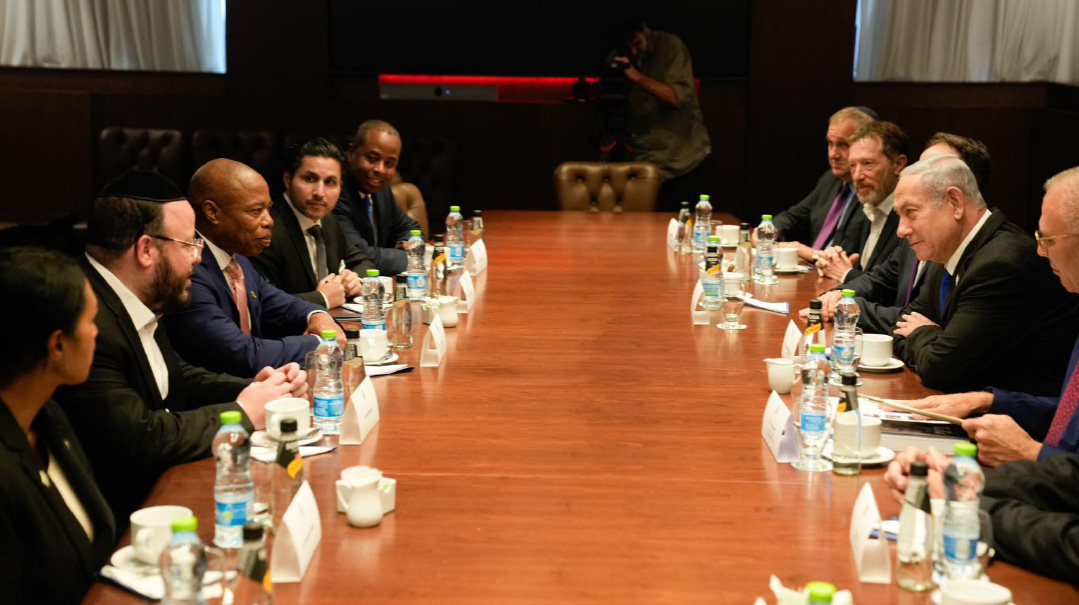
“It’s not my job to determine what the people of Israel want” Eric Adams with Bibi Netanyahu
Judicious Performance
In a recent Mishpacha interview — picked up by the New York Times as part of their coverage for this trip — Adams said that he was eyeing the peaceful Golan Heights as a post-mayoral bolthole. Metaphorically, the bantering reference was apt; visiting Israel without getting sucked into the political controversy that has riven the country and brought hundreds of thousands into the streets is like tiptoeing through a Golan Heights field while trying to avoid treading on an old Syrian landmine.
Recent statements by President Biden and outgoing American ambassador Tom Nides against the government’s judicial reform program angered many Israelis, who saw them as heavy-handed interventions on behalf of the left-wing opposition.
Against that fraught background, either expressing an opinion or withholding judgment would have been seen as political statements.
Adams himself met with protest leaders, and heard from Bibi Netanyahu about the reforms, but didn’t express an opinion. He merely noted that the existence of opposing arguments in the name of strengthening democracy showed that there was a legitimate debate underway that should be decided by the voters.
Should American leaders be expressing their opinions about an internal Israeli debate, I asked?
“It’s not my job to determine the outcome of what the people of Israel want,” he replied. “They’re going to do what’s best for the country. And I think the best thing we can do is not to interfere with the politics of this nation.
“We’re dealing with our own challenges. And I wouldn’t want someone to come and interfere with what we’re doing in New York City, and I would not do that here.”
In an atmosphere in which Democrats have chosen to mix into Israel’s political clash, staying above the fray was more evidence that Eric Adams is forging his own far more centrist path than many in today’s Democratic Party.
There was also a dose of hearty common sense about the apocalyptic hysteria of some of Israel’s anti-reform rhetoric.
“I hear you are having a difficult moment in Israel,” he told Ruth Lande, a former Knesset member and adviser to Shimon Peres. “This is difficult? After all the Jewish People have gone through? Ask your grandparents what is difficult, they who had gone through the Holocaust.”
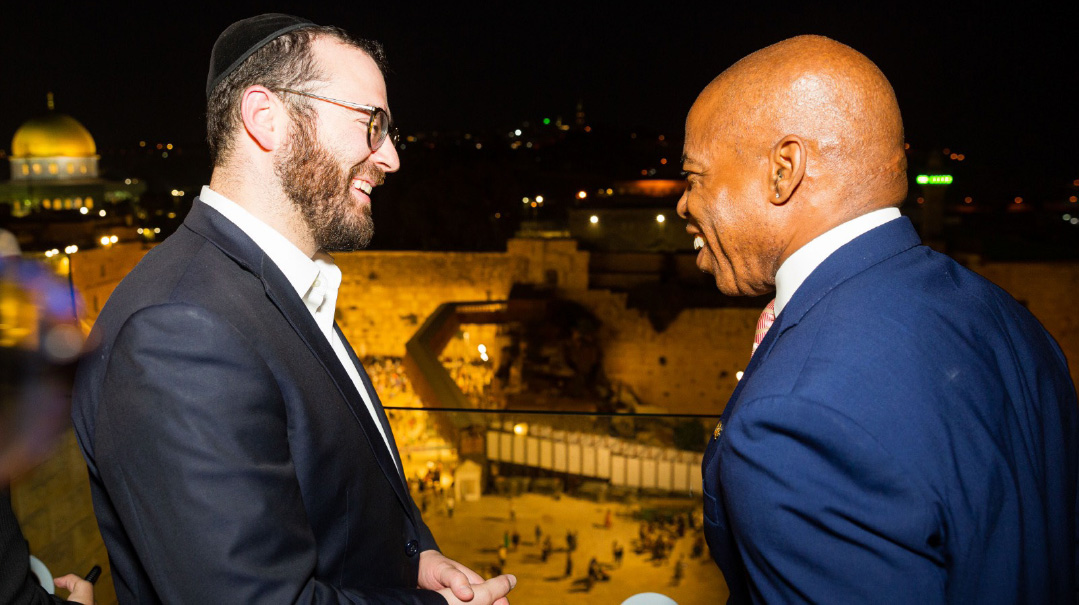
“Moshe Leon is the mayor of the second most important city in the world”
Upward Bound
The success of this Israel trip — in which Eric Adams was widely seen to have stayed on-message and controversy-free — matters going forward on a wider stage than New York City.
The mayor isn’t shy about his broader leadership ambitions. Even before winning the mayoral race, the former police officer projected his surge to the top of the polls on a tough-on-crime platform as a rebuke to the national Democratic Party’s swerve to the left on crime.
“Look at me and you’re seeing the future of the Democratic Party,” he said. “If the Democratic Party fails to recognize what we did here in New York, they’re going to have a problem in the presidential election. America is saying, we want to have justice and safety.
“New Yorkers and Americans want to be safe, and they don’t want to exist on programs; they want to exist on possibilities and opportunities,” adding. “I believe my message is going to cascade across the entire country.”
Since then, Adams has tacked both left and right on immigration, a national political issue. At the beginning of his term in office, he called New York a “sanctuary city” where migrants were welcome, tweeting, “There is a reason that Lady Liberty sits outside of NYC’s harbor.”
But faced with the deluge of almost 100,000 migrants over the last year, straining the city’s welfare services, Adams has changed course. In a swipe at the Biden administration’s failure to crack down on illegal migration, he charged, “New York City has been left to pick up the pieces of a broken immigration system,” and said that the city was heading for a financial crisis as a result.
What some on the left and right criticized as inconsistency was perhaps the Eric Adams brand of pragmatic politics, which doesn’t align with the current political narratives.
“I don’t apologize for believing in G-d. I’m a mayor that believes in family. I’m a mayor that believes in faith,” Eric Adams wrote recently in these pages.
Beyond pragmatism, that mantra — on display with his fascination about the history of the various religious structures around the Old City — is a potential game-changer in today’s Democratic Party, which has largely ceded the religious mantle to the Republicans.
Whether he can remake his party in his own image, drowning out the anti-Israel and anti-Orthodox streams that have risen to prominence, remains to be seen. But meanwhile Eric Adams takes back with him a message of forward-thinking ambition that he discussed with Israel’s prime minister.
“This country is super inspirational, because it started with such low GDP, and despite the tough neighborhood, look where it is. It shows that when you contribute to the neighborhood, everyone finds a way to embrace you.”
(Originally featured in Mishpacha, Issue 976)
Oops! We could not locate your form.





